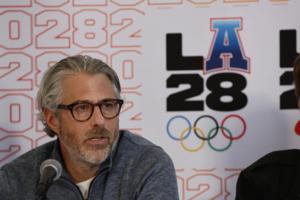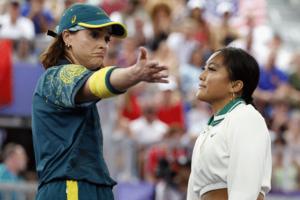Sports
/ArcaMax

Here's why LA28 officials are not worried about Trump's support for the Olympics
LOS ANGELES — President-elect Donald Trump's vow to make a "radical change" in government spending has raised concerns about Los Angeles' effort to host the 2028 Summer Olympics.
The private LA28 organizing committee has promised to cover the main cost of the Games, at an estimated $6.9 billion, through corporate sponsorships and other ...Read more

LA Olympics boss Reynold Hoover uses wartime problem-solving skills to plan 2028 Games
LOS ANGELES — The man in charge of preparing Los Angeles for the 2028 Summer Olympics was never an elite athlete. Never even worked in sports before.
So when Reynold Hoover talks about his new role as chief executive for LA28, the private group responsible for staging the Games and the ensuing Paralympics, he often refers to his stint as a ...Read more

Viral Olympic B-girl Raygun says she is done with competitive breakdancing
Breakdancing won't be an Olympic sport in 2028. And even if it was, the woman who is arguably the world's most famous B-girl would not participate.
Rachael Gunn, the Australian breakdancer better known as Raygun, said this week she will no longer take part in elite competitions after being widely mocked for her unorthodox routines at the Paris ...Read more

LA 2028 Olympics organizers hire top Nike executive to help boost revenue
LOS ANGELES — The private organizers of the 2028 Summer Olympics in Los Angeles have hired a top Nike executive to help generate the money they need to balance their $6.9 billion budget.
John Slusher, who formerly oversaw global sports marketing for the sneaker giant, will become chief executive of LA28's commercial operation, the group ...Read more

LA's promise of 'car free' Olympics running short on time and money
LOS ANGELES — With Los Angeles Olympics four years away and no detailed transportation plans yet, officials are concerned about a lack of money and time to create the "car free" Games that Mayor Karen Bass has promised.
Local officials have a litany of projects they want to complete ahead of 2028, from adding charging infrastructure to ...Read more

Santa Monica 'very close' to agreement to host beach volleyball during 2028 Olympics
LOS ANGELES — Santa Monica officials say they are “very close” to reaching an agreement to host beach volleyball during the 2028 Summer Olympics, even though it might end up costing the city more than $12 million.
That worst-case scenario is outlined in a 36-page report issued Tuesday night, a week ahead of an Oct. 8 City Council meeting ...Read more
Popular Stories
- Viral Olympic B-girl Raygun says she is done with competitive breakdancing
- LA's promise of 'car free' Olympics running short on time and money
- Here's why LA28 officials are not worried about Trump's support for the Olympics
- LA Olympics boss Reynold Hoover uses wartime problem-solving skills to plan 2028 Games
- LA 2028 Olympics organizers hire top Nike executive to help boost revenue





